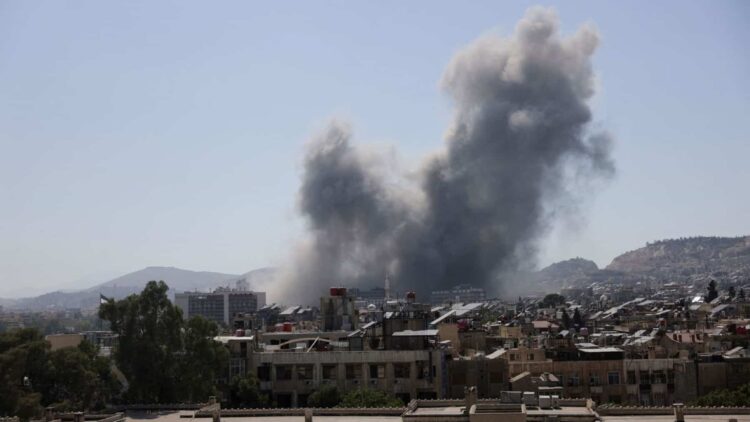For days in the Syrian province of Sweida, warfare raged but came to an end with the announcement of a cease-fire agreement between Syria and Israel. After several days of clashes that left hundreds dead, both sides decided to stop the hostilities with the mediation of the United States, Turkey and Jordan.
There have been several days of bombardment in Syria at the hands of Israel
From Sunday onwards there was more shelling when clashes took place between Druze militias and Sunni Muslim Bedouin tribes in the aforementioned province, so Syrian government forces intervened to restore order, but soon sided with the Bedouin tribes, which led Israel to react.
The attacks increased with dozens of raids on convoys and positions of the pro-government forces, but among the targets hit was the headquarters of the Syrian Ministry of Defense in the heart of Damascus. In just four days, the fighting left more than 700 people dead, including Druze civilians reportedly killed by pro-government militiamen.
The Druze community, historically loyal to Israel and with members serving in its army, became the key point of the Israeli bombings. According to analysts, Israel seized the moment to weaken the capacity of its old adversary, Syria, which after the fall of Bashar al-Assad, now under the command of Ahmed al-Sharaa, must consolidate power.
The United States played an important role in stopping the attacks
While fighting continued, U.S. Ambassador to Turkey Tom Barrack announced Thursday night that a truce was in the works to stop the violence, but the cease-fire was backed by Turkey, Jordan and other neighboring countries, which told Druze, Bedouin and Sunni to lay down their arms and seek peaceful coexistence.
“We call on Druze, Bedouin and Sunni to lay down their arms and, together with other minorities, build a new, united Syrian identity in peace and prosperity with their neighbors,” Barrack stated in a social media post. What is implied is that, set the tone of the agreement, it calls for the departure of government forces from the province and leaving the responsibility for internal security in the hands of Druze factions and leaders.
While this announcement was made, some complications persisted on Thursday night, when retaliatory attacks by Druze militias against Bedouin communities were recorded, which generated a new wave of displacements in the region, complicating the implementation of the ceasefire, but the US State Department clarified that it does not support the Israeli airstrikes, although it maintains its diplomatic and military support to Tel Aviv.
What needs to be addressed after the cessation of hostilities agreement
Despite notifying the ceasefire, there are doubts about its duration and therefore, Syrian government forces, who planned to return to Sweida to ensure stability and protection of institutions, delayed their deployment late on Friday because there may be clashes in isolated areas.
Turkey, Jordan and the US pledged to monitor compliance with the truce and support reconstruction and reconciliation initiatives between the various factions, but also those who intervened to bring the situation to a halt are watching the moves of the new Syrian leadership under Ahmed al-Sharaa, whose aim will be to restore stability without repeating past mistakes.
In any case, the agreement between Syria and Israel marks that Netanyahu’s government has no problem in presenting defense against certain situations and to continue attacking to defend its nation, something that is done by both sides but this cessation was confirmed by the US ambassador to Turkey, Tom Barrack, seeks to calm the region and protect the civilian population.

